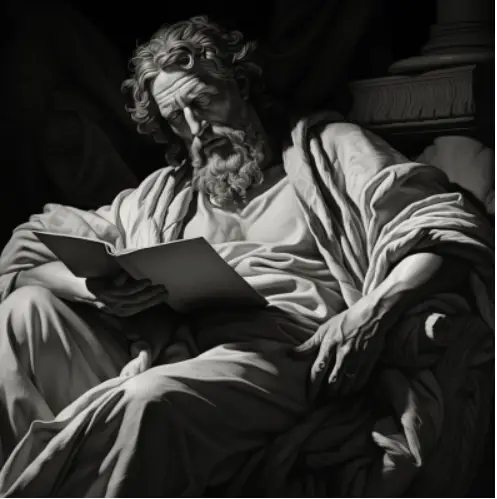What is Form of the Good with Plato? Plato’s philosophy, as outlined in his dialogues and specifically in “The Republic,” delves into the concept of the Form of the Good. This philosophical theory explores the nature of reality and what constitutes true knowledge. According to Plato, human beings exist in a physical world that is merely a shadow or reflection of a higher, intelligible realm where the Forms reside. The Form of the Good is considered the ultimate source of truth, goodness, and beauty.
What Is Form of the Good With Plato?
Plato believed that our understanding of reality is limited by our senses and that true knowledge can only be attained through rational thought and contemplation. He argued that philosophers, or philosopher kings, who possess superior intellect and insight should rule society with wisdom derived from their understanding of the Forms.
In Plato wrote, each particular object or idea in the physical world is an imperfect imitation or representation of its corresponding Form. For example, a chair we see in our everyday lives is just a pale reflection of the perfect Chair Form in the realm of ideals. Plato calls these Forms eternal and unchanging entities that provide a basis for evaluating things in this world.
While Plato’s theory may seem abstract or metaphysical to some, it addresses fundamental questions about existence, truth, and morality. By exploring these philosophical theories concerning forms and their relationship to human perception and understanding, Plato sought to uncover the true nature of reality beyond mere appearances.
Overall, Plato’s conception into the Form of the Good offers us insights into Western philosophy’s early foundations while raising intriguing metaphysical problems about what constitutes genuine knowledge and how we can strive towards living a virtuous life based on an understanding of true reality.
Form of the Good is a central concept in Plato’s philosophy, particularly in his work known as “The Republic.” Plato believed that human beings strive to understand the nature of reality and seek knowledge of ultimate truths. According to his theory of Forms, there exists a realm beyond the physical world where these eternal and unchanging Plato’s Form or Ideas exist.
The Life of Plato
Plato, a renowned philosopher and mathematician, was born in Athens, Greece around 427 BCE. His exact birthdate remains uncertain, but his contributions to philosophy and his enduring legacy are indisputable.
Early Years
As a young man, Plato witnessed the political turmoil and instability that plagued Athens during the Peloponnesian War. This tumultuous period deeply influenced his worldview and propelled him on a path of intellectual exploration.
Socrates’ Influence
One of the most significant influences on Plato’s philosophical development was his mentor, Socrates. Plato became captivated by Socrates’ unique teaching method known as the Socratic dialogue. Through questioning and critical thinking, Socrates encouraged his students to examine their beliefs and seek a deeper understanding of truth.
The Academy
Inspired by Socrates’ teachings, Plato founded the Academy in Athens around 387 BCE. This institution served as an educational center where scholars gathered to discuss philosophy, mathematics, astronomy, and various other subjects. The Academy remained operational for nearly nine centuries until its closure in 529 CE.
Philosophical Works
Plato’s philosophical ideas form the cornerstone of Western thought. His dialogues explore profound concepts such as justice, morality, knowledge, and the nature of reality itself. Some of his most notable works include “Plato’s Republic,” “Phaedrus,” “Symposium,” and “Phaedo.”
Legacy
Plato’s influence extends far beyond his own lifetime. His writings have sparked intense debate among scholars throughout history and continue to inspire philosophical discourse today. He laid the groundwork for many subsequent philosophers who built upon his ideas.
Plato’s life was marked by intellectual curiosity and a relentless pursuit of knowledge. From his early years witnessing political strife to founding one of history’s greatest educational institutions – the Academy – he left an indelible mark on philosophy that reverberates through the ages. His ideas and teachings have shaped and continue to shape our understanding of the world around us.
Exploring Eternal Forms: Blueprints of Reality
In Plato’s philosophy, the concept of Forms is fundamental to understanding the nature of reality. These Forms, according to Plato, are eternal and unchanging entities that exist beyond the physical world. In his exploration of the highest form, Plato delves into the essence of reality and posits that the Forms serve as the ultimate principles or blueprints, shaping the imperfect reflections we encounter in our everyday existence. Through the allegory of the cave in “The Republic,” Plato illustrates how the world we perceive is but a shadow of the true Forms, urging us to seek knowledge beyond mere appearances.
Unveiling Plato’s Form of the Good: The Apex of Truth, Goodness, and Beauty
At the pinnacle of Plato’s Forms lies the Form of the Good, considered by Plato as the highest form and the ultimate principle that illuminates all other Forms. This Form represents the apex of truth, goodness, and beauty in Plato’s philosophical framework. Plato argues that understanding the Form of the Good is essential for living a virtuous life. The philosopher kings, possessing superior intellect and insight, are envisioned by Plato to rule society with wisdom derived from their comprehension of the Form of the Good.
Philosophical Communion and Shared Understanding: The Concept of Share
Plato’s theory of Forms introduces the idea of shared understanding through philosophical communion. In the Platonic realm, where unchanging Forms exist, the concept of ‘share’ takes on a profound meaning. It goes beyond the material world’s sharing and encompasses a shared pursuit of knowledge, justice, and the highest good. Plato’s philosopher kings, guided by their understanding of the Forms, aspire to create a just society where the ideal of ‘share’ extends beyond the physical to the metaphysical, fostering a collective pursuit of the highest form.
These subheadings cover various aspects of Plato’s philosophy, including his theory of Forms, the Form of the Good, and the interconnected concepts of knowledge, justice, and the ideal world.
